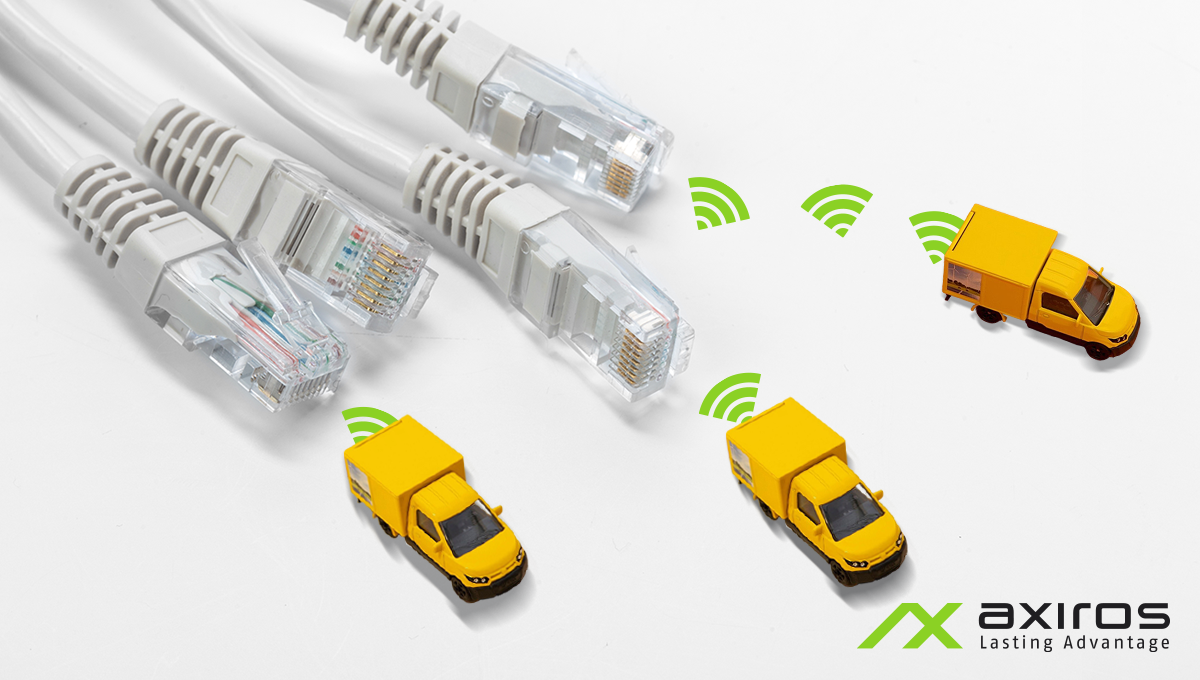Axiros Blog
Insights into the Telecom World: Latest Trends & Market Developments
Building Trust Through Transparency: How Axiros Uses SBOMs and Vulnerability Scans to Strengthen Software Security
In an era where digital trust is paramount, Axiros is setting the standard for software security. Discover how our proactive use of Software Bills of Materials (SBOMs) and continuous vulnerability scanning not only meets the stringent requirements of the EU Cyber Resilience Act (CRA) and NIS2 Directive, but also builds secure-by-design products, strengthens transparency, and delivers unparalleled peace of mind to our customers.
AX DHCP: Advanced IP Address Management for Service Providers
In this blog post, we explore how efficient IP address management underpins reliable network operations. As service providers face growing demands for seamless connectivity, Axiros’ AX DHCP delivers a scalable solution that unifies DHCP and IPAM—enabling automation, visibility, and control. From streamlining provisioning to optimizing address utilization, AX DHCP ensures future-ready, carrier-grade network performance.
Private vs Public Cloud: Choosing the Right Infrastructure for Your Managed Services
In this blog post, we explore the crucial decision telecom providers face when choosing between private and public cloud infrastructure for their managed services. With millions of connected devices to manage, the right choice can define your organization’s performance, compliance, and profitability.
The Effortless Device Management Revolution: Why Smart Organizations Choose Streamlined Solutions
In this blog post, you’ll discover why the best device management is the kind you never have to think about. AX DMS takes the complexity out of fleet control—automating updates, troubleshooting, and provisioning so your network just works, while your team stays focused on what matters most.
Signal Quality and Performance Monitoring for Fixed-Wireless Access (FWA)
Fixed-Wireless Access (FWA) is a key 5G use case, delivering broadband where fiber or copper aren’t feasible—whether in rural areas or for users on the move. But signal quality can vary, making performance monitoring critical to ensure a reliable experience.
In this blog post, we explore how the Axiros FWA Bundle helps operators track KPIs, detect network changes, and maintain consistent service quality.
RUSP — the OpenSource USP toolkit written in Rust turns 1.0
In this blog post, Daniel Egger—Principal Software Engineer at Axiros and co-author of the USP standard—shares the story behind RUSP, Axiros’ Rust-based Open Source toolkit for USP, which has now reached version 1.0. As a key contributor to the USP standard and lead on Axiros’ USP products, Daniel walks you through RUSP’s evolution—from a holiday side project in 2018 to a powerful, scriptable toolkit used in production.
TR-069 Lessons Learned: Unlock benefits with USP
In CPE management, TR-069 has dominated for over 20 years, offering clear data handling but revealing flaws over time. Instead of reworking it, a new protocol—TR-369, or User Services Platform—was developed to address these issues and align with modern needs. Learn more in our new blog post: TR-069 Lessons Learned: Unlock Benefits with USP.
Why Standardized TMF APIs are a Breakthrough for ISPs in the Wholesale Broadband Market?
As broadband access becomes a fundamental utility, internet service providers (ISPs) are under increasing pressure to deliver customer facing services faster and more efficiently than ever before. However, when sourcing access from multiple wholesale fiber providers, ISPs often hit the same bottleneck: inconsistent APIs, proprietary processes, and costly integration work.
Fortunately, that’s changing – thanks to industry-standard APIs and collaborative efforts like the TM Forum’s “Broadband as a Service – The Future of Wholesale Broadband Ordering” Catalyst projects.
Leveraging AI in Device Management: Enhancing Current Practices
Traditional device management solutions, such as TR-069, have played a significant role in enabling remote configuration, monitoring, and updates. However, as networks grow in complexity and scale, these legacy protocols face limitations in security, efficiency, and flexibility. In this blog, we explore the challenges of traditional device management, the evolution of new protocols, and the transformative role AI plays in optimizing device operations. Let’s dive into the future of intelligent device management.
Why Am I Losing Customers? Part 2 - Technical Understanding Oriented Towards End Customer Behaviour
In Part 1 of this blog series, we explored data-driven insights into churn behaviour, leveraging Axiros' solutions to analyze real-world subscriber data. Through graphical analysis, correlation studies, PCA dimensionality reduction, and statistical tests, we uncovered key indicators of churn and how telecom providers can mitigate it.
Now, in Part 2, we take a deeper dive into Churn Analysis and Correlation Insights, identifying patterns that drive customer churn.
Why Am I Losing Customers? Part 1 - Technical Understanding Oriented Towards End Customer Behaviour
In part 1 of this blog post, we explore data-driven insights on churn behavior, leveraging Axiros' solutions to analyze real-world subscriber data. Through graphical analysis, correlation studies, PCA dimensionality reduction, and statistical tests, we uncover the key indicators of churn and what telecom providers can do to reduce it.
So, the big question remains: Why are your customers leaving—and how can you stop it? Let’s dive in.
Signal Quality and Performance Monitoring in FTTX Networks
In this blog, we explore signal quality and performance monitoring in FTTX networks, a critical aspect of ensuring reliable fiber-optic broadband. Key challenges include detecting issues like connection loss, fiber bends, and splicing problems. Axiros’ AXTRACT FTTX Bundle enables advanced monitoring through metrics like Receive/Transmit Power and the Network Health Index, which links ONT health to customer Quality of Experience (QoE). With comprehensive dashboards for ONTs, OLTs, and PON ports, this solution ensures effective management of FTTX networks.
Revolutionizing Customer Experience: AXWIFI Optimization Strategies for Automated Support
AXWIFI is at the forefront of this necessity, offering advanced monitoring, troubleshooting, and optimization capabilities in real-time. With its ability to automatically or manually optimize network settings, AXWIFI ensures that users experience minimal downtime and maximum performance. Read the full blog post to learn about AXWIFI's sophisticated recommendations and real-time diagnostics that are revolutionizing customer support through AI automation.
AXWIFI Excellence: Optimizing Signal Quality and Resolving Wi-Fi Challenges for Seamless Connectivity
In today's digital age, seamless connectivity is crucial. AXWIFI stands out as a leading solution in this domain, offering advanced tools to ensure optimal WiFi performance. The AXWIFI solution is built on three main features: monitoring, troubleshooting, and optimization. Together, these elements provide a comprehensive approach to managing and enhancing WiFi networks. Read the full blog post to learn about AXWIFI Excellence.
How We Deliver Managed Services at Axiros
In the telecom industry, maintaining operational efficiency, scalability, and security is becoming increasingly complex, particularly when it involves managing extensive device fleets and/or legacy Auto Configuration Servers (ACS). At Axiros, we understand these challenges and have designed Axiros Managed Services to provide a comprehensive solution for telecom operators looking to simplify their device management operations. Read the full blog post to learn how we deliver Managed Services at Axiros.
Navigating the Seas of Telco Operations with Axiros’ Managed Services
In today's rapidly evolving technological landscape, advanced solutions bring significant improvements to telco operations and efficiencies. Yet, these advancements also present challenges that can be daunting without the right support. From ensuring high availability with cloud services to battling cybersecurity threats and maintaining regulatory compliance with GDPR and INS2, telcos face a complex array of challenges. This is where Managed Services can be your guiding star.
IoT Environments Monitoring and Management by Axiros
In this blog we present a smart office environment with ZigBee sensors for monitoring the ambient conditions (temperature, humidity, pressure), and occupancy of shared spaces. Additionally, there are water leak sensors deployed to monitor the areas prone to flooding. AXESS, AXTRACT, and AXACT are used for configuration and management of the environment, and for monitoring both sensor availability data, and data about the monitored environment.
IoT – Unfulfilled Expectations and Reality
The predictions about IoT market made during its peak of inflated expectations phase about 10 years ago were quite optimistic and forecasted 50 billion devices in 2020 and total worldwide market revenues of around 1,8 trillion USD. However, based on predictions from 2020 and 2021, the current IoT landscape in 2023 connects around 15 billion devices, while the worldwide market revenues are around 290 billion USD. In this blog, we try to ascertain why these expectations remained unfulfilled and what are the current prospects for IoT.
USP Interoperability Benchmarking Explained
Providing customers, the ability to use and integrate any device which supports one or more of the many standardised device management and monitoring protocols is in Axiros’ DNA. The most utilised standard by our customers is still TR-069, but with the introduction of its successor USP, we’re seeing a major shift in aspects of the lower layers of communication in comparison to TR-069. The analysis of the actual device capabilities and the representation in the data they provide, is a process we call Interoperability Benchmarking. To learn more, check out our blog post.
Part 2 - DOCSIS Monitoring
In the previous part of our blog series, we discovered the importance of monitoring critical network KPIs (Key Performance Indicators) that shape the Quality of Experience (QoE) for cable broadband users. In this part, we'll delve deeper into how the AXTRACT DOCSIS & PNM (Proactive Network Maintenance) bundles harness these KPIs to pinpoint critical locations and empower service providers to proactively tackle network challenges and consequently minimize customer churn before signal impairments cause critical service degradation and customer unsatisfaction.




















